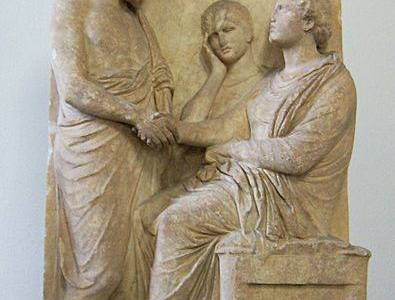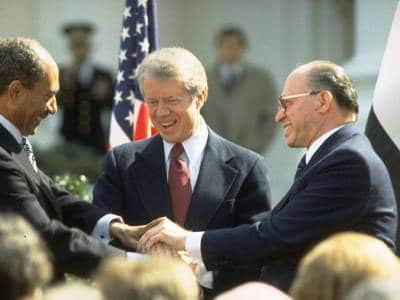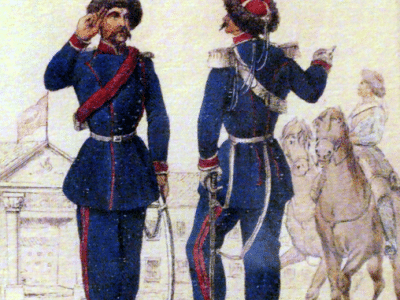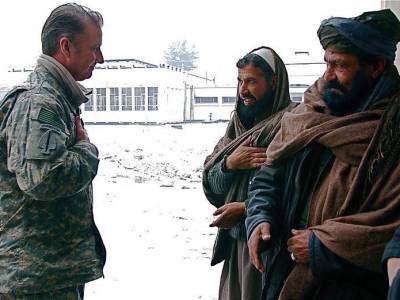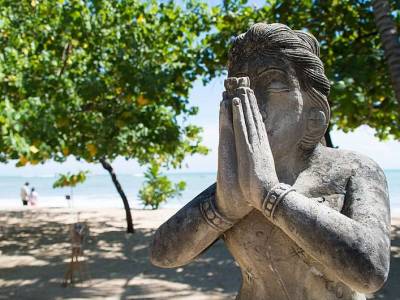Hello, Goodbye
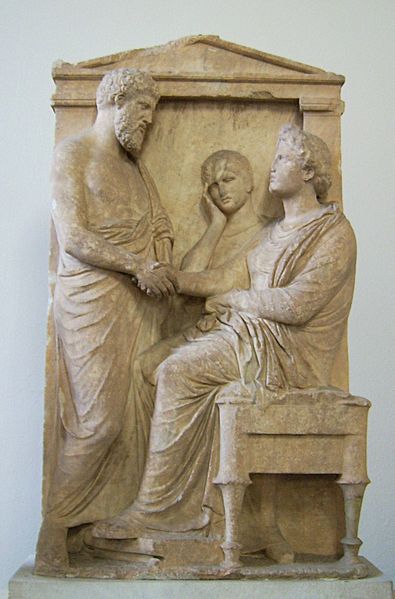
Author: Cheryl Benard
Dr. Anthony Fauci has become a calm, sober presence during the White House coronavirus briefings, and most of us listen to him attentively when he explains the latest data, projections, and advice. But one of his predictions passed with little comment, maybe because it was a bit abstract and we’re all focused right now on navigating things day-to-day. Still, his prediction pertained to something that for all of us has been very much a part of our daily lives. Dr. Fauci said that we would probably never go back to the practice of shaking hands. Ever. Again.
This got my attention because, as a sociologist, I’ve been distracting myself by speculating on how this pandemic might reshape our social habits and behavior in the long run. Also, the handshake has fascinated me for a long time. As a doctoral student, my work took me to the Middle East, where I was confronted with a persistent conundrum. Some men would shake my hand with no hesitation and would even approach me with their hand outstretched. But others would take a step back away from me as though in fright. The more urbane of them would immediately compose themselves to greet me instead with a nod, and/or by placing their palm on their heart. My problem was compounded by the fact that as someone who came from Austria, I followed the European protocol, in which the woman must extend her hand first. It didn’t take me very long to realize that this was not going to be a good idea in the Middle East, since it was just as likely to leave me with my hand extended in lonely outer space a good percentage of the time. Intellectually, I got that. Other cultures have other customs, and you have to take that in stride. But on a deeper level, to be honest, it felt insulting. The message was: I am unable to regard you as simply a colleague or a human being, because your first and foremost attribute is your gender. Also it was a bit galling that they got to decide. It was one thing when we were in their country and on their turf, but they did the same in Europe or the U.S. I wasn’t the only one who found this irritating; Iranian state visits to Europe often got off to a bad start when their advance team announced this rule. As the former Iranian chargé to Finland, Hossein Alizadeh admitted, their diplomats would “apologize and say they don’t ever shake hands with women, and explain that they respect women and don’t mean to insult anyone and so on. But in practice we would see that many women become offended.”
If no one shakes hands at all anymore, that problem will vanish. And that will probably be good for our collective hygiene; even without corona, there are other illnesses such as the flu and a range of gastrointestinal ailments that travel via insufficiently washed hands. Still, the handshake also transmitted a host of good meanings and messages, and those will be sad to lose.
The handshake began as a signal of peaceful intent. By extending your open hand to a stranger, you showed that you were unarmed and intended no violence. Archaeological evidence shows that the custom goes back at least to ancient Greece. From “my intentions are peaceful” it eventually evolved into “my intentions are honorable,” becoming the traditional way to seal an agreement or a business deal without the need for a written document or an immediate payment. It signaled respect and recognition. It said: welcome to the team. It said: let’s reach an agreement. And let’s not forget the one characteristic of this custom that may now cause its demise: it involves physical touch and is, in fact, one of the few interactions that allows strangers to touch each other.
So, if it really has to go, what will replace it? Social customs usually evolve on their own, so we will have to wait and see. It’s a safe bet that greeting by kissing is also on its way out, however strongly it may have been anchored in European and Western urban culture. I personally won’t miss it too much. It was always confusing, as you never knew which protocol your counterpart followed: one kiss, two on opposite cheeks, three, or in the case of some French friends, four. Even one kiss presented its difficulties, as you had to guess which side of the face the other person was intending to aim for. And it was always hard to draw the line. If most people in the group were friends, but one or two were new additions, should they be kissed as well, or did they first have to complete some sort of arbitrarily determined probational period? Usually but not always, the female newcomer would be kissed by the other women right away, upon departure at least if not yet upon arrival, but the men would have to wait for a second meeting at the very least. I am guessing that kisses upon arrival will in the future be reserved for close family members whom one has not seen for a while, and for special occasions such as holidays and birthdays. Will the mistletoe kiss survive? Let’s see.
The handshake was a Western invention, but with globalization, it had become fairly global at least in business settings and for younger people. So the question is, can we all agree on a universal replacement? Let’s review the existing alternatives to see if one stands out.
The fist bump will probably depart along with the handshake, as consisting of too much direct skin contact and physical proximity. Also, it’s just too informal to work across the board. I don’t give high odds to the elbow bump, either. It’s awkward and a bit silly, and too obviously “invented.” The clap on the shoulder has the same proximity issue, plus it’s often used in a unilateral way: one person congratulating or consoling or encouraging another. If one tried to enact it mutually, that would be awkward. It’s also too intimate and would hardly work, for example, for a first business meeting.
What remains are the non-contact greetings. For the West, we have two prominent candidates. There is first, the touching of your hand to your forehead. This has a history similar to the handshake: it signals non-hostile intent. It mimicked the gesture of an armed knight, removing his helmet or pushing up its visor, to demonstrate that he did not need this protection since his intentions were friendly. This gradually evolved to men removing their hats, then just tipping their hats, then just touching their hats, and when they were not wearing hats, just touching their forehead. A parallel custom developed within the military, where this gesture evolved into the salute.
The second Western non-contact greeting is the bow. On the negative side, the custom has pretty much disappeared in the modern West, except at formal ballroom dances. Also, it was never done by women, who would curtsy instead, a custom that quite frankly I don’t see as making a comeback outside of Windsor Castle. On the positive side, the bow hasn’t been gone for that long, and it coincides with a still absolutely common Eastern practice, so it ought to be possible to universalize it. Will the Japanese be able and willing to standardize their complex system of bowing, that takes into account the occasion and the age and the relative status of the parties, and agree to a homogenized minimalist international bow? If we take this route, the gesture will probably end up reduced to a nod.
Another Eastern contender comes from Persian civilization. This is the hand-on-the-heart gesture. I think this has potential, because it is universally understandable. With no explanation required, pretty much everyone on the planet can recognize that this conveys friendliness and courtesy. Is it a tad too frilly for, let’s say, the American mid-West or even for most American men? Possibly…it’s going to be a tough sell to transition from a grip firm enough to make the other party wince, to a courtly hand-on-the-heart. Lastly, there is the namaste, the Asian greeting where you press your palms together at chest height. It might be too New Age for some; on the other hand, President Trump has actually already implemented this greeting in White House meetings with diplomats, for example with the Irish Prime Minister in March.
Of course, maybe Dr. Fauci was trying to break it to us gently, and we will basically never interact closely enough with strangers again to need any sort of personal greeting. Then all we need to do is design a few new emojis…
Tell us what you think.
Will the handshake survive corona? If not, which alternative do you vote for? Or if you have another nomination or invention, let us know! info@archinternational.org
Photo Credits:
Photo 1: https://commons.wikimedia.org/wiki/File:Funerary_stele
Photo 2: https://commons.wikimedia.org/wiki/File:Flickr_-_GovernmentPressOffice-_TheTripleHandshake.jpg
Photo 3: https://www.inherentresolve.mil/photos-images/igphoto/2001616483/
Photo 4: https://commons.wikimedia.org/wiki/File:2nd_Regiment_of_Polish_Sultan_Cossacks.png
Photo 5: https://www.flickr.com/photos/afgmatters/4295267125
Photo 6: https://commons.wikimedia.org/wiki/File:1_namaste_greeting_statue_in_Bali_Indonesia.jpg

